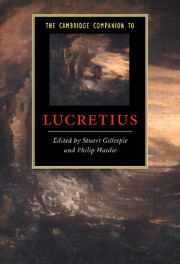Book contents
- Frontmatter
- Introduction
- Part I: Antiquity
- Part II: Themes
- 8 Lucretius and the history of science
- 9 Moral and political philosophy: readings of Lucretius from Virgil to Voltaire
- 10 Lucretius and the sublime
- 11 Religion and enlightenment in the neo-Latin reception of Lucretius
- Part III: Reception
- Dateline
- List of works cited
- Index of Main Lucretian Passages Discussed
- General Index
9 - Moral and political philosophy: readings of Lucretius from Virgil to Voltaire
from Part II: - Themes
Published online by Cambridge University Press: 28 May 2010
- Frontmatter
- Introduction
- Part I: Antiquity
- Part II: Themes
- 8 Lucretius and the history of science
- 9 Moral and political philosophy: readings of Lucretius from Virgil to Voltaire
- 10 Lucretius and the sublime
- 11 Religion and enlightenment in the neo-Latin reception of Lucretius
- Part III: Reception
- Dateline
- List of works cited
- Index of Main Lucretian Passages Discussed
- General Index
Summary
The interpretation of Epicurean political philosophy as embodied in the DRN has rarely proved simple. The problem begins with the Epicurean repudiation of public life accompanied by a retreat into a small group of friends who cultivate tranquillity. Against this apparently straightforward backdrop, the dense, passionate verses of Lucretius have provoked the later transmitters of Epicureanism into engaging an astonishing range of political concerns and positions. This chapter will consider four key historical moments in the interpretation of the DRN. For all their many differences, each of the four periods sponsors inventive and wide-ranging responses to the poem’s moral and political tendencies. In each case, cultural arbiters are inspired and provoked by what they posit as the poem’s tension between its passionate disruption of contemporary norms and its clarion call for a disengaged tranquillity. Construing their own age - sometimes approbatively, sometimes apprehensively - as a time of upheaval, they struggle to decide whether Lucretius offers recourse from or instigation to contemporary disorder, decadence and uncertainty. Finally, in each historical context, readers recognise that the poem’s moral and political arguments are rendered the more complex by Book 5’s extended account of civilisation.
First there is Virgil’s emulation of Lucretius in the politically vexed but nonetheless Caesarean Georgics. Second, at the end of the sixteenth century and beginning of the seventeenth, Michel de Montaigne and Francis Bacon engage the moral and political dimensions of Lucretius in their efforts to make sense of religio-political turmoil, wanton civil bloodshed and philosophical impasse.
- Type
- Chapter
- Information
- The Cambridge Companion to Lucretius , pp. 149 - 166Publisher: Cambridge University PressPrint publication year: 2007
- 2
- Cited by

